外研社一起小学四年级上语法总结及练习题
外研版4上英语语法练习题
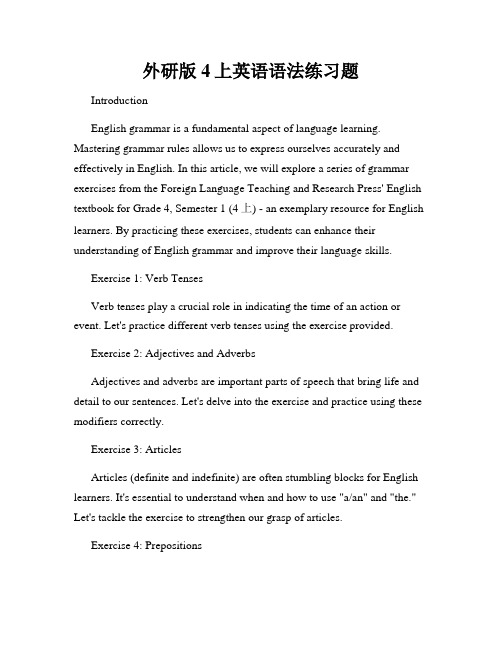
外研版4上英语语法练习题IntroductionEnglish grammar is a fundamental aspect of language learning. Mastering grammar rules allows us to express ourselves accurately and effectively in English. In this article, we will explore a series of grammar exercises from the Foreign Language Teaching and Research Press' English textbook for Grade 4, Semester 1 (4上) - an exemplary resource for English learners. By practicing these exercises, students can enhance their understanding of English grammar and improve their language skills.Exercise 1: Verb TensesVerb tenses play a crucial role in indicating the time of an action or event. Let's practice different verb tenses using the exercise provided.Exercise 2: Adjectives and AdverbsAdjectives and adverbs are important parts of speech that bring life and detail to our sentences. Let's delve into the exercise and practice using these modifiers correctly.Exercise 3: ArticlesArticles (definite and indefinite) are often stumbling blocks for English learners. It's essential to understand when and how to use "a/an" and "the." Let's tackle the exercise to strengthen our grasp of articles.Exercise 4: PrepositionsPrepositions are words that show relationships between other words in a sentence. They can be tricky to use correctly. Let's take a closer look at the exercise to better comprehend the usage of prepositions.Exercise 5: ConjunctionsConjunctions are connecting words that join different parts of a sentence. They help us create cohesion and coherence in our writing. Let's explore the exercise and practice using conjunctions to link ideas seamlessly.Exercise 6: Reported SpeechReported speech allows us to convey what someone else has said. It involves a change in tense, pronouns, and other words. Let's engage in the exercise to enhance our understanding of reported speech.Exercise 7: Modal VerbsModal verbs are used to express ability, possibility, necessity, and more. They add layers of meaning to our sentences. Let's navigate through the exercise and practice using modal verbs accurately.Exercise 8: Relative PronounsRelative pronouns connect dependent clauses to independent clauses. They help us provide additional information about a noun or subject. Let's take on the exercise to improve our usage of relative pronouns.Exercise 9: Passive VoiceThe passive voice is used when the focus is on the action rather than the doer of the action. It's essential to understand the construction and usage ofthe passive voice. Let's complete the exercise to enhance our skills in using the passive voice.ConclusionGrammar exercises are invaluable in consolidating our knowledge and application of English grammar. Through these exercises, students can refine their language skills and develop a strong foundation in English grammar. By dedicating time and effort to practicing the exercises provided in the Foreign Language Teaching and Research Press' English textbook for Grade 4, Semester 1, students can confidently navigate the complexities of English grammar and excel in their language learning journey.。
外研社(一起点)四年级上册M1知识要点+基础卷
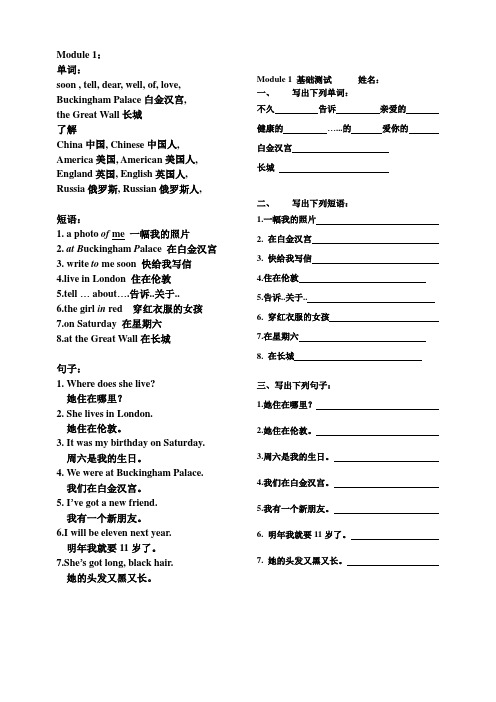
Module 1:单词:soon , tell, dear, well, of, love, Buckingham Palace白金汉宫,the Great Wall长城了解China中国, Chinese中国人, America美国, American美国人, England英国, English英国人, Russia俄罗斯, Russian俄罗斯人,短语:1. a photo of me 一幅我的照片2. at B uckingham P alace 在白金汉宫3. write to me soon 快给我写信4.live in London 住在伦敦5.tell … about….告诉..关于..6.the girl in red 穿红衣服的女孩7.on Saturday 在星期六8.at the Great Wall在长城句子:1. Where does she live?她住在哪里?2. She lives in London.她住在伦敦。
3. It was my birthday on Saturday. 周六是我的生日。
4. We were at Buckingham Palace. 我们在白金汉宫。
5. I’ve got a new friend.我有一个新朋友。
6.I will be eleven next year.明年我就要11岁了。
7.She’s got long, black hair.她的头发又黑又长。
Module 1 基础测试姓名:一、写出下列单词:不久告诉亲爱的健康的…...的爱你的白金汉宫长城二、写出下列短语:1.一幅我的照片2. 在白金汉宫3. 快给我写信4.住在伦敦5.告诉..关于..6. 穿红衣服的女孩7.在星期六8. 在长城三、写出下列句子:1.她住在哪里?2.她住在伦敦。
3.周六是我的生日。
4.我们在白金汉宫。
5.我有一个新朋友。
6. 明年我就要11岁了。
四年级英语上册知识点汇总(外研版一起)

四年级英语上册知识点汇总(外研版一起) 外研一起四年级上册期末复知识点一、动词过去式以下是一些常见动词的过去式形式:go(去)——wenteat(吃)——atesee(看见)——sawhave(度过)——hadXXX(需要花费)——tookbuy(买)——boughtis(是)——wasdo(做)——didwear(穿)——worefall(掉下、摔倒)——fellare(是)——weresay(说)——saidmake(制作)——madespeak(讲话)——spokefind(发现)——foundrun(跑)——ranget(得到、抓住)——got come(来)——cameride(骑)——rodefly(飞)——flewsing(唱歌)——sangdrink(喝)——XXXlose(丢失)——lostXXX(变成)——XXXcut(切、割)——cutlearn(研究)——learntclean(打扫)——cleanedXXX(赢、获胜)——won break(打破)——brokehurt(使疼痛、使受伤)——hurtwash(清洗)——washedfinish(完成)——finishedhelp(帮助)——XXXcook(煮)——cookedphone(打电话)——phonedplay(玩、游戏)——XXXstay(停留)——XXXwatch(看)——watchedpaint(绘画)——paintedlive(居住)——livedinvent(发明)——inventedpractise(练)——practisedbump(碰、撞)——XXXclimb(爬)——climbedcarry(拿、搬)——carriedXXX(发生)——happened二、名词的复数形式一般名词复数形式都是在名词后加s, 以下是一些例子:candy(糖果)——XXXthis(这)——theseleaf(树叶)——XXXis(是)——arethat(那)——thosechild(儿童)——children三、惯搭配或短语以下是一些常见的惯搭配或短语:read XXX(读一封信)live in(住在)a photo of(一张……的照片)at Buckingham Palace(在白金汉宫)on Sunday(在星期天)1.XXX.2.Please XXX.3.XXX project.4.XXX(your) shirt/skirt/trousers for me?5.I need to cleanmy(your) room before my guests arrive.6.Can you helpmymum carry these groceries inside?7.XXX.8.I like to watchTV before bed.9.XXX she works.10.XXX.11.I want to paintapicture of the sunset.12.XXX I XXX.13.I always XXX.14.We like to playfootball on the weekends.15.It's getting late。
外研版四年级上册英语语法总结

外研版四年级上册英语语法总结本文总结了外研版四年级上册英语教材中的语法要点。
1. 一般现在时- 表示经常或惯性的动作或状态。
- 动词原形加-s或-es作为第三人称单数形式。
- 否定句在动词前加do not/does not。
例如:- I usually go to school by bus.- She eats breakfast every morning.- They don't play football on Sundays.2. 一般过去时- 表示过去某个时间发生的动作或存在的状态。
- 动词过去式的变化规则:大多数动词直接加-ed;以不发音的e结尾的动词只加-d;以辅音加y结尾的动词,把y改成i加-ed。
- 否定句在动词前加did not。
例如:- We went to the park last weekend.- She watched a movie yesterday.- They didn't visit their grandparents.3. 现在进行时- 表示现在正在进行的动作。
- 动词be的不同形式(am/is/are)+ 动词ing形式。
例如:- He is playing basketball now.- They are studying English at the moment.- I am not watching TV right now.4. there be句型- 表示某地存在某物或某人。
- 用there is/are + 名词来表示。
例如:- There is a cat in the living room.- There are some books on the table.5. 情态动词can- 表示能力、许可、允许等。
- 用can + 动词原形。
例如:- I can swim very well.- He can't ride a bike.- Can you speak French?以上是外研版四年级上册英语语法的总结。
外研版英语四年级上册期末考试重难点知识点复习和练习.doc

Modulel Unitl Go straight on.一直往前走。
互动学习精炼重难点:1.表示“迷路的”lost •迷路的。
lost是一个形容词。
常用句型是“人/物+am/is/are + los化意思是“人/动物迷路了 /丢失了” o例如:My sister is lost.我的妹妹迷路了。
2.表示“住在……”live v•居住常见短语:live at +具体地点,住在某地。
注意:具体地点前一定要加介词at。
例如1:1 live at No.2 Park Street・我住在公园路2号。
如果主语是第三人称单数时要用lives.例如:She lives in Canada.她居住在加拿大。
3.表示“打扰一下”“Excuseme,噫思是“打扰一卜,对不起”。
当我们要麻烦别人或打扰别人吋,如问路,打断别人正在进行的事情, 询问问题时,为了表示礼貌或者是歉意,应当先说“Excuse me”,再提出自己的疑问。
4 •询问地点当你想知道“某地在哪里”,或者“到某地怎么走”时,常用句型"Wherein- 地点/处所?”这是由where引导的特殊疑问句,where的意思是“在哪里”,回答时不能用yes或no来回答,而应该用TFs+表示方位的介词短语”回答。
例如:・■一Where is the supermarket?超市在哪里?-…It9s on your left・它在你左边。
5.指路用语用英语给别人指路的常用语有:Turn right•向右转。
Turn left.向左转。
Go straight on. 一直向前走。
6.感谢用语及回答Thank you.谢谢你。
为感谢用语。
当他人帮助了口己或夸奖、赞美自己时,我们要说u Thank you 来表示感谢。
其回答为:You,re welcome•不用谢。
Module2walk walkingread readingPlay playingwatch watchinglisten listeningrun runningswim swimmingdancing dancelike:喜欢 v.walk run dance readswim play watch listen我喜欢… I like walk ing .1 2I like dancing. You like singing. We like running. You like swimming.I like playing computer games.i •表示“看 look 表示“看”的这个动作,动词。
外研社一起四年级上册 重点句型+过去式

Module1 Module 9(一)1、She lives in London. 1、What happened to you?2、It was my birthday on Saturday. 2、Sam fell off his bike.3、We were at Buckingham Palace. 3、I fell on the watermelon.4、I’ve got a new friend. 4、I bumped my head.Module 2 Module 101、Yesterday, I cleaned my room. 1、What’s the matter with you?2、I finished my homework. 2、I’ve got a stomach ache.3、Then I helped my mum. 3、What did you eat yesterday?4、Yesterday, Mr Smart cooked noodles. 4、I ate chocolate biscuits.5、Amy painted a picture. 5、Wang Fei’s got a cold.Module 31、She didn’t walk to school yesterday. 写出下列单词的过去式。
2、She didn’t learn these things yesterday. go— are—3、I didn’t play football yesterday.see— is—4、I didn’t ride my bike yesterday. eat— am—Module 4 have— do—1、Chinese people invented paper.buy— cut—2、Chinese people invented printing. wear— win—3、He invented this bicycle in 1839.fall— come—Module 5 hurt— put—1、We went to the Great Wall.learn— run—2、We saw lots of mountains.take— say—3、We ate apples.make— bump—4、You had a good time.5、I wore warm clothes.翻译短语。
外研社英语教材(一年级起点版)四年级上册句型总结

外研社英语教材(一年级起点版)4年级上册句型总结1. 动词过去式① 动词过去式不规则变化:go - went (去), see - saw (看见), take - took (花费;采取), eat - ate (吃), have - had (有), buy - bought (买), fall - fell (掉下、摔倒), is / am - was (是), are - were (是), get - got (得到,抓到), do - did (做), say - said (说), s i ng - s a ng (唱歌), make - made (制作), r i de - r o de (骑), w i n - w o n (赢,胜利), wr i te - wr o te (写), dr i nk - dr a nk (喝), wear - wore (穿), speak - spoke (讲话), break - broke (打破), fly - flew (飞), lose - lost (丢失), find - found (发现), c o me - c a me (来), bec o me - bec a me (变成), run - ran (跑), learn - learnt (学习)不规则变化, - 外研社英语4年级上册(一年级起点版)② 动词过去式直接+ed:wash - washed (清洗),finish - finished (完成), clean - cleaned (打扫), help - helped (帮助), cook - cooked (煮), phone - phoned (打电话), watch - watched (观看), paint - painted (绘画), play - played (玩耍), live - lived (居住), invent - invented (发明), stay - stayed (停留), practise - practised (练习), bump - bumped (碰、撞), happen - happened (发生), climb - climbed (爬)动词过去式直接+ed, - 外研社英语4年级上册(一年级起点版)③ 动词过去式变y为i+ed:carr y - carr i ed(拿走,带走)动词过去式变y为i+ed, - 外研社英语4年级上册(一年级起点版)④ 动词过去式不变:cut - cut (切、割), hurt - hurt (使疼痛,使受伤)动词过去式不变, - 外研社英语4年级上册(一年级起点版)(英语动词过去式的变化大部分是有规律的加"ed",或者改写为"ied",也有不规则变化,不规则的我们见一个积累一个就好。
外研版英语四年级上册知识点归纳总结(完整版,直接打印)

外研版四年级英语上册知识总结姓名:Module 11.go straight on 直着走2.turn left 向左转turn right 向右转3.excuse me 对不起,打扰一下4.next to 贴近,紧靠...旁边so much 十分,非常5.at the station 在车站up the hill 上山down the hill 下山6.询问某个地方位置的句型:Where + be动词+ 主语?例句:——Excuse me, Where’s the school, please?打扰一下,请问学校在哪里?——Go straight on......7.表示感谢的句型:问句:——Thank you so much! 非常感谢!答语:——You’re welcome. 不客气。
Module 21.take pictures 照相listen to music 听音乐talk to 和......交谈watch TV 看电视read a book 看书write a letter 写信fly a kite 放风筝ride a bike 骑自行车play basketball 打篮球play football 踢足球play with 玩...... look at 看2.介绍某人的句型:This is...... 这是......例句:This is my mother. 这是我的妈妈。
3.现在进行时:表示说话时正在进行或发生的动作。
“正在做......”肯定结构:主语+be(am/ is/ are) + 现在分词+ 其他。
例句:I’m taking picture. 我在照相。
She’s reading a book. 她正在看书。
4.现在进行时的特殊疑问句句型:What + be + 主语+ doing?例句: What are you doing? 你正在做什么?What is he/ she / it doing ? 他/ 她/ 它正在做什么?What are they doing ? 他们正在做什么?Module 3 1.get on the bus 上公共汽车lots of 许多in the park 公园里on the lake 湖面上dragon boat 龙舟play chess 下象棋draw picture 画画soya milk 豆浆2.现在进行时的句型结构:①肯定形式:主语+ be( am/ is/ are)+ doing+ 其他成分。
最新外研版小学英语(一年级起点)四年级上册知识汇总
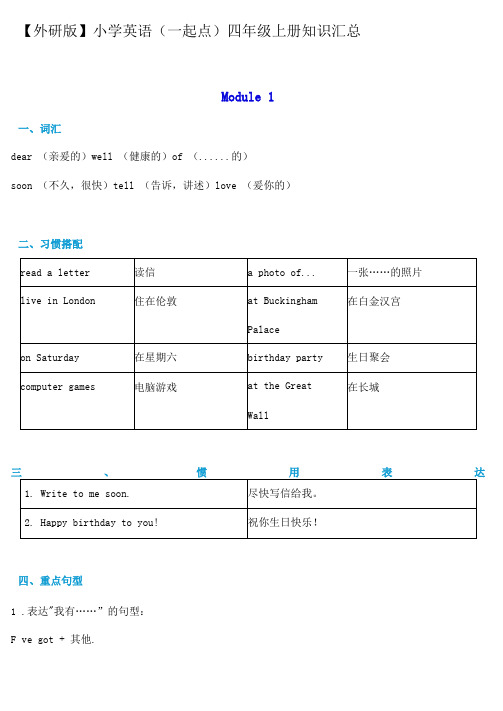
二、习惯搭配
1. have a good time过得愉快2.go on a trip去旅行
5. be able to能够6.go to the Great Wall去长城
7.climb to the mountain爬到顶部
8.see lots of mountains看到许多山
扩充:"where"意为"在哪里",用来询问地点。
答语中的"He/She/It"用于指代前面提到的某人或某物。
一、单词
1.went(go的过去式)去
2.saw(see的过去式)看见
3.trip出行,旅行
4.took(take的过去式)需要花费
5.fifty五十
6.minute分钟
7.top顶部
8.mountain|±1
--1 went to the zoo.(我去动物园了。)
6.-- Amy, you look tired. Where did you go yesterday?(艾米,你看起来很累。你昨天 去哪里了 ?)
—I didnzt go out. I stayed at home.(我没出去。我待在家里了。)
二.习惯搭配
wash my shirt
洗我的衬衫
cook noodles
做面条
wash my skirt
洗我的裙子
paint a picture
因一幅画
clean my room
打扫我的房间
wash my trousers
洗我的裤子
三.重点句型
表达"过去某人做某事":
主语+动词过去式+其他.
外研版英语 四年级上册 句子专项精讲精练【汇总】
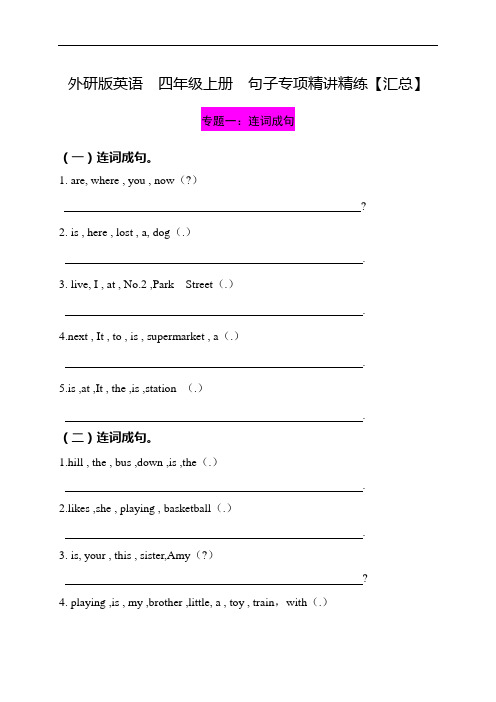
外研版英语四年级上册句子专项精讲精练【汇总】专题一:连词成句(一)连词成句。
1. are, where , you , now(?)?2. is , here , lost , a, dog(.).3. live, I , at , No.2 ,Park Street(.).4.next , It , to , is , supermarket , a(.).5.is ,at ,It , the ,is ,station (.).(二)连词成句。
1.hill , the , bus ,down ,is ,the(.).2.likes ,she , playing , basketball(.).3. is, your , this , sister,Amy(?)?4. playing ,is , my ,brother ,little, a , toy , train,with(.).5. am ,I , reading , book , a,now(.). (三)连词成句。
1. is , flying , Lingling ,her , kite(.).2. to , his , he , talking , is , friend(.).3. doing , what , Tom , where , is(?).4. is , she , reading , about , a , China , book(.).5.am, I , housework , doing ,my(.). (四)连词成句。
1. doing , what , you , are , now(?)?2. bus , on , the , get , Let , us(.).3.the , doing , what , are , kids , now(?)?4.things , of , we, can , lots , see , interesting(.).5.at , the , lake , the , look , people , on(.). (五)连词成句。
外研版四年级上册英语语法练习总结

外研版四年级上册英语语法练习总结外研版四年级上册英语语法练旨在帮助学生巩固和提高他们的语法技能。
以下是对这些练的总结:1. 名词:练中包含了关于名词的知识点,如单数名词、复数名词和可数名词。
通过这些练,学生可以加深对不同类型名词的理解,并学会正确使用它们。
名词:练习中包含了关于名词的知识点,如单数名词、复数名词和可数名词。
通过这些练习,学生可以加深对不同类型名词的理解,并学会正确使用它们。
2. 动词:练涵盖了动词的各种形态,如一般现在时、过去时和进行时。
通过练,学生可以掌握动词的正确使用,构造简单的句子。
动词:练习涵盖了动词的各种形态,如一般现在时、过去时和进行时。
通过练习,学生可以掌握动词的正确使用,构造简单的句子。
3. 形容词:练中介绍了基本的形容词,并引导学生学会使用形容词来描述事物的特征。
形容词:练习中介绍了基本的形容词,并引导学生学会使用形容词来描述事物的特征。
4. 副词:练中涉及到一些常用的副词,帮助学生研究如何描述动作的方式和程度。
副词:练习中涉及到一些常用的副词,帮助学生学习如何描述动作的方式和程度。
5. 冠词:练中提供了对冠词的练,帮助学生正确使用不同类型的冠词。
冠词:练习中提供了对冠词的练习,帮助学生正确使用不同类型的冠词。
6. 句子结构:练中包含了一些有关句子结构的知识点,如主语、谓语和宾语。
通过这些练,学生可以学会构建简单的句子,并理解它们的基本结构。
句子结构:练习中包含了一些有关句子结构的知识点,如主语、谓语和宾语。
通过这些练习,学生可以学会构建简单的句子,并理解它们的基本结构。
通过完成外研版四年级上册英语语法练,学生可以提高他们的英语语法技能,并更好地理解和运用所学的语法知识。
这些练的内容简单易懂,有助于学生快速掌握基本的语法规则。
以上是对外研版四年级上册英语语法练习的总结。
通过这些练习,学生可以巩固和提高他们的语法技能。
这些练习内容简单易懂,有助于学生快速获得基本语法知识。
外研社(一起点)四年级上册M2知识要点+基础卷

Module 2:单词:skirt, clean, finish, dirty, paint, Mr, phone 动词及其过去式:clean - cleaned, finish - finished,wash - washed, help – helped,cook – cooked, phone – phoned,watch – watched, paint – paintedplay – played, listen - listened短语:1. clean one’s room 打扫某人的房间2.finish one’s homework 完成某人的作业3. wash one’s trousers 洗某人的裤子4. help one’s mum 帮助某人的妈妈5. cook noodles 做面条6. watch TV 看电视7. paint a picture 画一幅画8. play the flute 吹笛子9. listen to music 听音乐10. play with me 和我一起玩句子:1.Yesterday,I cleaned my room.昨天我打扫房间了。
2.I washed my trousers.我洗裤子了。
3.Then I helped my mum.然后我帮助妈妈了。
4.Amy painted a picture.艾米画了一幅画。
5.Yesterday, Mr Smart cooked noodles.昨天,Smart先生做了面条。
6.Tom helped him.Tom帮助了他。
7.Ms Samrt phoned Grandma.Samrt女士给奶奶打了电话。
8.Sam watched TV.Sam 看了电视。
Module 2基础测试卷姓名:单词:短裙脏的先生根据汉语写出下列动词及其过去式:打扫完成洗帮助烧菜打电话看(电视)绘画玩/演奏听短语:1.打扫某人的房间2.完成某人的作业3.洗某人的裤子4.帮助某人的妈妈5.做面条6.看电视7.画一幅画8.吹笛子9.听音乐10.和我一起玩句子:1.昨天我打扫房间了。
外研社(一起点)四年级上册M6知识要点+基础卷

Module 6:
单词:
become - became, gold, ago, magic, paintbrush woman, real, bad, away, take-took, leaves, only, painting,
say-said, angry,
短语:
1. magic paintbrush 有魔力的画笔
2. paint …with用…画
3. take ... away把…带走
4. come back 回来
5.long ago 很久以前
句子:
1.This old woman didn’t have food.
这个老妇人没有东西吃。
2.But it didn’t become gold.
但是它没有变成金子。
3.It became a snake!
它变成了一条蛇!
4.He didn’t come back. 他没有回来。
Module 6:
单词:
金子, 以前, 生气的, 只,仅仅, 离开,真实的, 画笔,有魔力的, 妇女,坏的,
树叶(复数)绘画作品
写出动词及其过去式:
拿走,
说
变成,
短语:
1. 有魔力的画笔
2. 用…画
3.把…带走
4.回来
5.很久以前
句子:
1.这个老妇人没有东西吃。
2.但是它没有变成金子。
3.它变成了一条蛇!
4.他没有回来。
外研英语(一起)四年级上M6知识点及基础测试
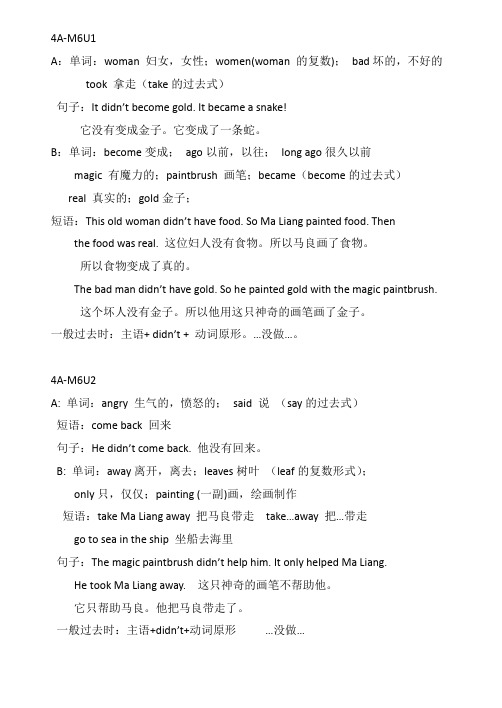
took 拿走(take的过去式)句子:It didn’t become gold. It became a snake!它没有变成金子。
它变成了一条蛇。
B:单词:become变成;ago以前,以往;long ago很久以前magic 有魔力的;paintbrush 画笔;became(become的过去式)real 真实的;gold金子;短语:This old woman didn’t have food. So Ma Liang painted food. Then the food was real. 这位妇人没有食物。
所以马良画了食物。
所以食物变成了真的。
The bad man didn’t have gold. So he painted gold with the magic paintbrush.这个坏人没有金子。
所以他用这只神奇的画笔画了金子。
一般过去时:主语+ didn’t + 动词原形。
…没做…。
4A-M6U2A: 单词:angry 生气的,愤怒的;said 说(say的过去式)短语:come back 回来句子:He didn’t come back. 他没有回来。
B: 单词:away离开,离去;leaves树叶(leaf的复数形式);only只,仅仅;painting (一副)画,绘画制作短语:take Ma Liang away 把马良带走take…away 把…带走go to sea in the ship 坐船去海里句子:The magic paintbrush didn’t help him. It only helped Ma Liang.He took Ma Liang away. 这只神奇的画笔不帮助他。
它只帮助马良。
他把马良带走了。
一般过去时:主语+didn’t+动词原形…没做…took 拿走(take的过去式)句子:It didn’t become gold. It became a snake!它没有变成金子。
外研社一起小学四年级上语法总结及练习题
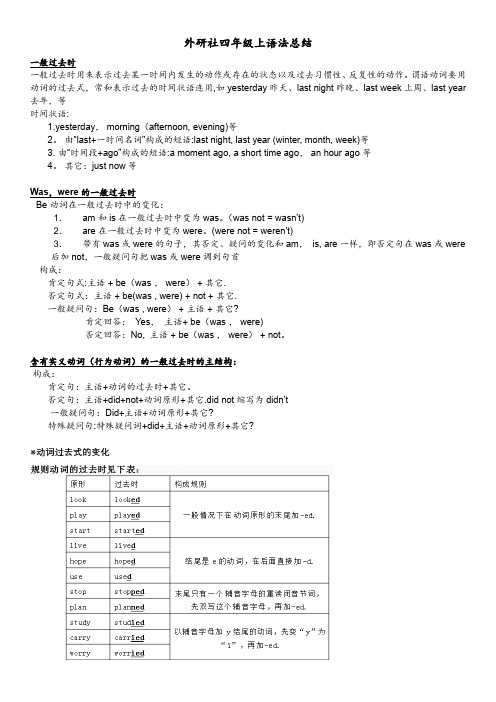
外研社四年级上语法总结一般过去时一般过去时用来表示过去某一时间内发生的动作或存在的状态以及过去习惯性、反复性的动作。
谓语动词要用动词的过去式,常和表示过去的时间状语连用,如yesterday昨天、last night昨晚、last week上周、last year 去年,等时间状语:1.yesterday,morning(afternoon,evening)等2。
由“last+一时间名词"构成的短语:last night,last year(winter,month,week)等3.由“时间段+ago”构成的短语:a moment ago,a short time ago,an hour ago等4。
其它:just now等Was,were的一般过去时Be动词在一般过去时中的变化:1.am和is在一般过去时中变为was。
(was not=wasn’t)2.are在一般过去时中变为were。
(were not=weren't)3.带有was或were的句子,其否定、疑问的变化和am,is,are一样,即否定句在was或were 后加not,一般疑问句把was或were调到句首构成:肯定句式:主语+be(was,were)+其它.否定句式:主语+be(was,were)+not+其它.一般疑问句:Be(was,were)+主语+其它?肯定回答:Yes,主语+ be(was,were)否定回答:No, 主语+be(was,were)+not。
含有实义动词(行为动词)的一般过去时的主结构:构成:肯定句:主语+动词的过去时+其它。
否定句:主语+did+not+动词原形+其它.did not缩写为didn’t一般疑问句:Did+主语+动词原形+其它?特殊疑问句:特殊疑问词+did+主语+动词原形+其它?※动词过去式的变化小学常用不规则动词的过去式选择( )1. My father ______ill yesterday .A . isn’tB . aren’tC . wasn’tD . weren't ( )2. ______your parents at home last week ﹖A . IsB . WasC . AreD . Were()3.The twins______in Dalian last year.They______here now.A.are; were B.were;are C.was; are D.were;was()4.______your father at work the day_____yesterday(前天)﹖A.Was;before B.Is; before C.Was; after D.Is;after()5.—Who was on duty last Friday﹖—______.A.I am B.I was C.Yes,I was D.No,I wasn’t用be动词的适当形式填空。
外研版4上英语语法练习题
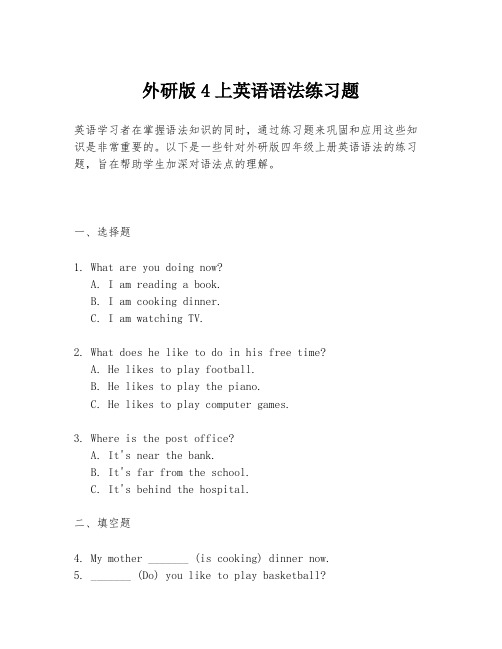
外研版4上英语语法练习题英语学习者在掌握语法知识的同时,通过练习题来巩固和应用这些知识是非常重要的。
以下是一些针对外研版四年级上册英语语法的练习题,旨在帮助学生加深对语法点的理解。
一、选择题1. What are you doing now?A. I am reading a book.B. I am cooking dinner.C. I am watching TV.2. What does he like to do in his free time?A. He likes to play football.B. He likes to play the piano.C. He likes to play computer games.3. Where is the post office?A. It's near the bank.B. It's far from the school.C. It's behind the hospital.二、填空题4. My mother _______ (is cooking) dinner now.5. _______ (Do) you like to play basketball?6. The library is _______ (next to) the supermarket.三、改错题7. She is go to the park. (×)Correct: She is going to the park.8. They likes apples very much. (×)Correct: They like apples very much.9. I am have a big family. (×)Correct: I have a big family.四、翻译题10. 我正在学习英语。
四年级外研版英语上册句型转换考点知识练习

四年级外研版英语上册句型转换考点知识练习班级:_____________ 姓名:_____________【句型转换】1. 按要求改写下列句子。
[1]good, I, friend, have, a(.)(连词成句)[2]Put your eraser near your pencil box.(译成汉语)[3]I can use chopsticks.(改为否定句)I_______ _______chopsticks.[4]-Is it near the window? -No, it isn’t.(改为复数句)-_______ _______near the window? -No,_______ _______.[5]There are three people in my family.(就句子主题意思提问)_______ _______ _______are there in your family?2. 按要求写句子。
1.Are these tomatoes? (做肯定回答)2.Is this your hat? (做肯定回答)3.They are Amy''s.(对句子主题意思提问)4.These are jackets.(对句子主题意思提问)3. 按要求完成句子。
[1]Do you like art?(改为陈述句)[2]I like fruit. I don’t like vegetables. (合并为一句话)[3]She likes to play games. (改为否定句)[4]My favourite clothes are shorts. (对句子主题意思提问)[5]What’s your favourite school work?(根据实际情况回答问题)4. 按要求完成句子。
1. They are cleaning the windows. (对句子主题意思提问)______ ______ they ______?2. Is he folding the clothes? (作否定回答)_____, _____ _____.3. the, Mom, dishes, washing, is (.) (连词成句)4. they, the, are, floor, sweeping (?) (连词成句)5. 按要求改写句子。
外研社一年级起点英语四年级上册语法知识汇总
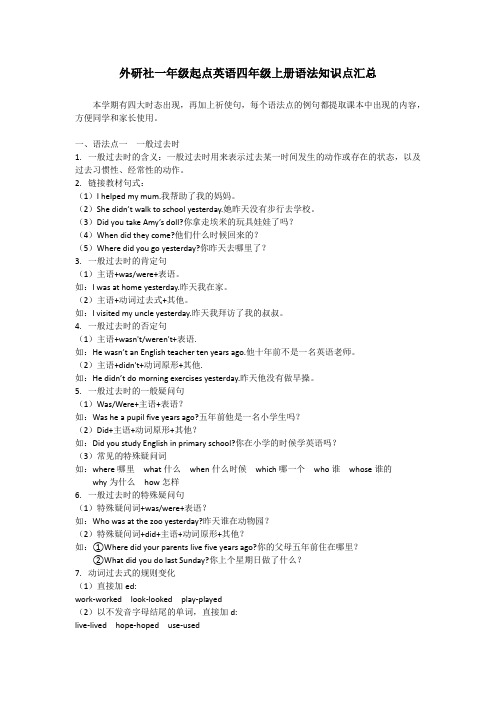
外研社一年级起点英语四年级上册语法知识点汇总本学期有四大时态出现,再加上祈使句,每个语法点的例句都提取课本中出现的内容,方便同学和家长使用。
一、语法点一一般过去时1.一般过去时的含义:一般过去时用来表示过去某一时间发生的动作或存在的状态,以及过去习惯性、经常性的动作。
2.链接教材句式:(1)I helped my mum.我帮助了我的妈妈。
(2)She didn’t walk to school yesterday.她昨天没有步行去学校。
(3)Did you take Amy’s doll?你拿走埃米的玩具娃娃了吗?(4)When did they come?他们什么时候回来的?(5)Where did you go yesterday?你昨天去哪里了?3.一般过去时的肯定句(1)主语+was/were+表语。
如:I was at home yesterday.昨天我在家。
(2)主语+动词过去式+其他。
如:I visited my uncle yesterday.昨天我拜访了我的叔叔。
4.一般过去时的否定句(1)主语+wasn't/weren't+表语.如:He wasn’t an English teacher ten years ago.他十年前不是一名英语老师。
(2)主语+didn't+动词原形+其他.如:He didn’t do morning exercises yesterday.昨天他没有做早操。
5.一般过去时的一般疑问句(1)Was/Were+主语+表语?如:Was he a pupil five years ago?五年前他是一名小学生吗?(2)Did+主语+动词原形+其他?如:Did you study English in primary school?你在小学的时候学英语吗?(3)常见的特殊疑问词如:where哪里what什么when什么时候which哪一个who谁whose谁的why为什么how怎样6.一般过去时的特殊疑问句(1)特殊疑问词+was/were+表语?如:Who was at the zoo yesterday?昨天谁在动物园?(2)特殊疑问词+did+主语+动词原形+其他?如:①Where did your parents live five years ago?你的父母五年前住在哪里?②What did you do last Sunday?你上个星期日做了什么?7.动词过去式的规则变化(1)直接加ed:work-worked look-looked play-played(2)以不发音字母结尾的单词,直接加d:live-lived hope-hoped use-used(3)以辅音字母+y结尾的单词,变y为i,再加ed:study-studied carry-carried worry-worried(4)以元音字母+y结尾的单词,直接加ed:enjoy-enjoyed play-played(5)以辅音字母结尾的重读闭音节单词,双写词尾的辅音字母,再加ed:stop-stopped plan-planned8.动词过去式的不规则变化(1)改变动词中的元音字母:drink-drank(2)变动词尾的d为t:send-sent(3)与动词原形保持一致:hurt-hurt(4)变ay为aid:say-said9.一般过去时的标志词yesterday昨天yesterday morning昨天早晨yesterday afternoon昨天下午yesterday evening昨天晚上the day before yesterday前天last night 昨晚last week上周a moment age之前just now刚刚二、语法点二一般现在时1.一般现在时的含义:一般现在时表示经常发生或习惯性的动作、状态。
外研版一年级起点四年级上册的语法题

外研版一年级起点四年级上册的语法题一、简介外研版一年级起点四年级上册是小学四年级学生的英语教材,其语法部分涵盖了英语基础语法知识和运用。
本文将对该教材中的语法题进行详细分析和解答,帮助学生更好地掌握英语语法知识。
二、名词复数形式1. 单词变复数形式在外研版一年级起点四年级上册中,名词的复数形式是英语语法中的基础知识。
划分名词的复数形式分为以下几种情况:(1)一般情况下,在名词后加-s构成复数形式,如cat-cats, dog-dogs;(2)以s, x, ch, sh等发音为/s/或/z/结尾的词,在名词后加-es构成复数形式,如bus-buses, box-boxes;(3)以辅音字母+y结尾的名词,变复数时将y变为i,再加-es构成复数形式,如baby-babies, strawberry-strawberries.2. 不规则复数形式除了一般情况下的复数形式,外研版一年级起点四年级上册还涉及到一些不规则的复数形式,例如:(1)些名词存在单数和复数形式一样,如sheep-sheep, deer-deer;(2)一些名词的复数形式与单数形式完全不同,如man-men, woman-women;(3)一些名词没有复数形式,如water, rice.解答练习题:1.写出以下名词的复数形式:(1)book, (2)mouse, (3)watch, (4)child, (5)woman, (6)knife.答案:(1)books,(2)mice,(3)watches,(4)children,(5)women,(6)knives.三、动词的现在进行时1. 构成方式在外研版一年级起点四年级上册中,动词的现在进行时是表达正在进行或临时的动作的时态。
构成现在进行时要根据主语的不同情况采取不同的变化方式:(1)当主语是第三人称单数时,在动词原形后加-ing,如She is running, He is reading.(2)当主语是第一人称或第二人称单数时,通常在动词前加am或is 构成现在进行时,如I am watching, You are playing.(3)当主语是复数形式时,通常在动词前加are构成现在进行时,如They are singing, We are dancing.2. 特殊情况外研版一年级起点四年级上册中还涉及到一些特殊情况下的现在进行时,如:(1)以不发音的e结尾的词,在变为现在进行时时通常去掉e,再加-ing,如write-writing, take-taking;(2)以重读闭音节结尾,末尾只有一个辅音字母的词,在变为现在进行时时要双写这个辅音字母,再加-ing,如run-running, swim-swimming.解答练习题:1.用am/is/are填空构成现在进行时。
- 1、下载文档前请自行甄别文档内容的完整性,平台不提供额外的编辑、内容补充、找答案等附加服务。
- 2、"仅部分预览"的文档,不可在线预览部分如存在完整性等问题,可反馈申请退款(可完整预览的文档不适用该条件!)。
- 3、如文档侵犯您的权益,请联系客服反馈,我们会尽快为您处理(人工客服工作时间:9:00-18:30)。
根据要求改写句子
1. Will you please read it again more slowly?
(改为祈使句)
__________ __________ again more slowly, please.
learn
leave let
light
lose make
过去式 was were
became began built bought could caught came
cut dug did drew drank drove ate fell fed felt fought found flew got gave went had heard held hurt kept knew learnt learned left let lit lighted lost made
B: Yes, I________ . B : Yes, it________ . B :Yes , we________ . B: Yes, she________ . B : Yes, they________ . B: Yes , he________ . B: He________ at school. B : It is a big city________
D. Is; after
( )5 . — Who was on duty last Friday ﹖
— ______.
A. I am
B. I was
C. Yes, I was
D . No, I wasn't
用 be 动词的适当形式填空。 1. A :________ you at home yesterday? 2. A :________ it sunny in London now? 3. A :________ you at the park now? 4. A :________ your mother out yesterday? 5. A :________ they at school yesterday? 6. A :________ he strong then? 7. A :Where________ he now? 8. A :Shenzhen wasn't big________ .
中文意思 可能
意思是 遇见,见面 必须,应该
放 阅读
琦 跑 说 看见 卖 发送 放置 摇晃 应该 照耀 表现,表演 唱 坐 睡觉 闻 说 拼 站 游泳 荡秋千 拿,花费 教 告诉 思考 扔 醒来
穿 将 赢
写
( )3 . The twins ______ in Dalian last year . They ______ here now .
祈使句
表达说话人对对方的叮嘱、劝告、请求或命令等 ,往往有表示请求、命令、希望、禁止、劝告等意思 . 祈使句一般没有主语 ,实际上是省略了主语 “You”句.末用感叹号或句号 ,用降调朗读 .肯定结构都以动词原形开头 . 例如: Catch the ball! 接球 !(句子的意思是让 “你 ”接球)
wake
wear will
win
write
过去式 might meant met must
put read rode ran said saw sold sent set shook should shone showed sang sat slept smelt spoke spelt stood swam swung took taught told thought threw woke waked wore would
请选择正确的词,把下列句子补充完整。 1. I _____________ ( ask / asked / is asking ) him a question yesterday. 2. Tom _____________ ( read / is reading / reads ) English now. 3. Did you ______________ ( water / watered / waters ) flowers last week? 4. Let ’_s____________ ( get / got / getting ) on the No. 1 bus. 5. We often ___________ ( watch / watches / watched ) TV at home. 6. Judy didn ’_t___________ ( went / go / going ) to school yesterday. 7. His dad ______________ ( works / worked / is working ) hard every day. 8. There ____________ ( were / are / was ) some trees near houses two years ago. 9. My cousin ____________ ( studies / studied / study ) in a middle school in Guangzhou. 10. Mr. White _____________ ( came / comes / is coming ) China last year. 11. She is going to ___________ ( have / had / has ) a big party this Sunday. 12. Where did you ____________ ( meet / met / meeting ) Miss White. 13. They wanted to ___________ (go / went / going ) to Beijing last week. 14. Look, Tom ____________ ( watches / watched / is watching ) TV in the living-room 。 15. What ___________ (did / does / is) the girl do this morning?
A. are; were
B . were; are C . was; are
D . were; was
( )4 . ______ your father at work the day _____ yesterday( 前天)﹖
A. Was; before
B . Is; before
C. Was; after
中文意思 是 是 变成 开始 建筑 买 可以 抓住 来 切 挖 做 画画 喝 驾驶 吃 落下 喂养 感觉 大家
寻找到 飞 得到 给 去
有,吃 听见 握住 受伤 保持 知道 学习
离开 让 点燃
丢失 制作
现在式 may mean meet must put read ride run say see sell send set shake shall shine show sing sit sleep smell speak spell stand swim swing take teach tell think throw
用括号内所给动词的适当形式填空。 1. __________ (not, be) late. 2. ____________ (dust) the dressing table. 3. ____________ (not, speak) with your mouth full of food. 4. ____________ (not, talk) and ____________ (read) a book. 5. ____________ (not, drop) the nice vase, Sam. 6. ____________ (look) out! A car is coming. 7. ____________ (give) us ten years and just see what our country will be like. 8. ____________ (not, let) the baby cry. 9. Open the window and ____________ (shut) the door. 10. Let ’ s ____________ (sweep) the floor.
was 或 were
含有实义动词(行为动词)的一般过去时的主结构: 构成:
肯定句:主语 +动词的过去时 + 其它。 否定句:主语 +did+not+ 动词原形 + 其它。 did not 缩写为 didn ’t 一般疑问句: Did+ 主语 + 动词原形 +其它? 特殊疑问句:特殊疑问词 +did+ 主语 + 动词原形 + 其它 ?
外研社四年级上语法总结
一般过去时
一般过去时用来表示过去某一时间内发生的动作或存在的状态以及过去习惯性、
反复性的动作。 谓语动词要用
动词的过去式, 常和表示过去的时间状语连用, 如 yesterday 昨天、 last night 昨晚、 last week 上erday , morning(afternoon, evening) 等 2. 由“ last+一时间名词 ”构成的短语: last night, last year (winter, month, week) 等
3. 由“时间段 +ago”构成的短语: a moment ago, a short time ago, an hour ago 等
祈使句的肯定句式有三种形式 ,即 1)Do 型(以行为动词原形开头) ,例如: Sit down 坐下 ! 2)Be 型(以 be 开头) ,例如: Be quiet ! 安静 ! 3)Let 型 (以 let 开头) ,例如: Let me help you.
